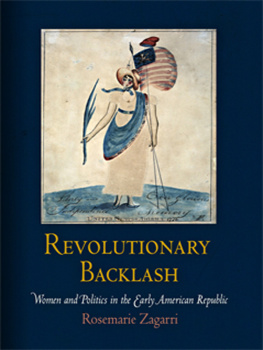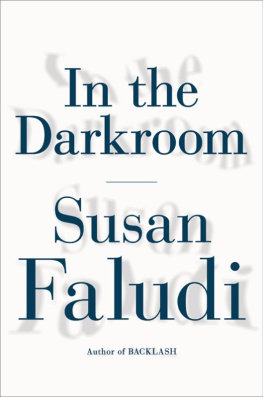Stiffed
The Betrayal of the American Man
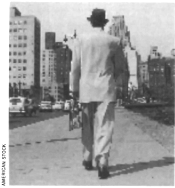
Susan Faludi

TO RUSS

Contents
CHAPTER 12 REBELS IN THE KINGDOM
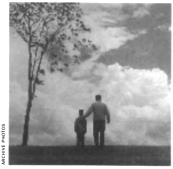
PART ONE
DEPARTURES
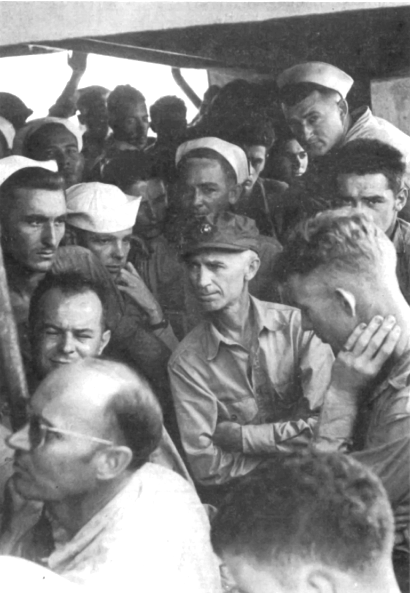
Ernie Pyle Aboard The Aircraft Carrier Uss Cabot, World War II.
CHAPTER
1
THE SON, THE MOON, AND THE STARS
WHEN I LISTEN TO THE SONS BORN after World War II, born to the fathers who won that war, I sometimes find myself in a reverie, conjured out of my own recollections and theirs. The more men I talk to, the more detailed this imagined story becomes. It is the story of a boy in bed pretending to sleep, waiting for his father. Tonight, the father has promised to reveal to the son a miraculous inheritance: the transit of an artificial star.
The door opens, and the hall light streams in, casting a cutout shadow man across the bedroom floor. For a moment, from the boys vantage point, his father seems almost unreal, a flattened spectral image. Then the shadow moves forward into the room, hustling the boy into a jacket over his cowboy pajamas, arming him with a big chrome flashlight, digging out his Keds from under a heap of clothes in the closet. The boy pulls the coat around him and, even though it is August, feels wrapped in a delicious and unexpected comfort, enveloped in his fathers hushed exuberance.
Earlier that evening, while his mother was busy scraping dishes in the kitchen, the boy and his father had hunched conspiratorially over the latest issue of Life magazine, the father pointing out features of the fantastical orb they were to observe, just the two of them, at an hour later than the boy had ever been allowed to be awake: Ten stories high! Seven times as bright as the North Star! His father said the satellite was really more of a balloon, a satelloon, and told him how it had been clamped down with huge clothespins and folded into an egg-shaped magnesium sphere for the launch; how the shell had hatched open, right on time, when it reached its orbit, a mighty man-made explosion giving birth to a big, shiny beach ball called Echo. His father had said Echos skin was half the thickness of the cellophane wrap on his cigarette pack; a meteorite could puncture it, even the suns rays might disturb its course. It could collapse at any moment! And it was this that would linger in the boys mind: that something so powerful could be so fragile.
The boy, clutching his flashlight and his Davy Crockett cap, races after his father along the shadowy upper hallway past the bedroom where his mother lies sleeping, then down the stairs and through the living room where the blank eye of the new Philco TV gazes coolly upon their passage. On a sticky July evening a month ago, he had sat in front of the Philco with his parents and watched a young presidential nominee on a confetti-strewn proscenium turn his face ceremonially to the west and call on the young men of a new generation to join a race for the mastery of the sky. It was up to boys like him, the man had said, to save not just the Earth but the far side of space from a Communism that had already penetrated into Asia.
He follows his father through the kitchen, the Frigidaire thrumming in the darkness, out the screen door and down the steps, where the aluminum patio furniture and the shiny globe of the barbecue grill phosphoresce like flying saucers come in for a landing. They are on the black-green quarter acre of clipped lawn now. His father bends, spreading his old navy peacoat like a blanket on the buzz-cut grass. The man and the boy in his raccoon cap kneel on the scratchy wool, two pioneers of the crabgrass prairie, and then the father snaps off the boys flashlight. All the familiar moorings drop away and they are swept up, a father and a son, into the bright sky. The father touches the boys shoulder and directs his vision to a faraway glimmer. The boy looks up, knowing that his father is pointing out more than just an object; it is a beacon of pride and secret knowledge, a paternal gift rocketing him into a future his father has helped to launch. At first, all he sees is the blanket of stars spreading out cold and vast between the trees. But then, there it is at last, a pinpoint of light crawling across the firmament, infinitesimally tiny, impossibly bright.
I KNEW THIS BOY. Like everyone else who grew up in the late 1950s and early 1960s, I knew dozens of him. He was Bobby on the corner, who roamed the neighborhood with his cap gun and holster, terrorizing girls and household pets. He was Ronnie, who wore his Superman suit way past Halloween and, sure he could fly, leaped from his living-room stairs one day and cracked his head open on the foyer linoleum. He was Frankie, who blew off part of his pinkie while trying to ignite a miniature rocket in the schoolyard. Even if he wasnt brought out into the backyard and shown an American satellite glinting in the sky, he was introduced to the same promise and the same vision, and by such a father. The fathers of that era often seemed remote, as unreal as those perfect dads on television, though not intentionally so. They were just fathers in the era after the war, living in brand-new suburbs with wives and children they barely knew, working at brand-new jobs on brand-new corporate campuses, miles from their brand-new aluminum-sided houses. Which is to say that the life of the postwar father was altogether too newly out of the box for him to understand it, much less explain it to his son.
Many of these fathers were veterans of World War II or Korea, but their bloody paths to virility were not ones they sought to pass on, or usually even discuss. Because the fathers offered few particulars about their baptisms at Normandy or Midway or Heartbreak Ridge, war was a remote romance that each boy had had to embellish with details culled from Sergeant Rock and his combat adventures in DC comics, or Sergeant Bilko and an endless procession of television war series (Crusade in Europe, Crusade in the Pacific, Victory at Sea, The Big Picture), or later, GI Joe and his miniature arsenal. Not that paternal knowledge of the war, even if shared, could have helped those sons, whose male proving grounds were to be on peaceful terrain. This was to be the era of manhood after victory, when the pilgrimage to masculinity would be guided not by the god of war Mars, but by the dream of a pioneering trip to the planet Mars. The satellite: here was a visible patrimony. And so Echo, with its reflective shell floating one thousand miles above the earth, became a remote point of triangulation connecting one generation of men to the next, and a visual marker of vaulting technological power and progress to be claimed in the future by every baby-boom boy. The men of the fathers generation had won the world and now they were giving it to their sons. Their nation had come into its own, powerful, wealthy, dominant, in control of the greatest destructive force ever imagined. The fathers had made their sons masters of the universe and it felt, as in the time of Alexander, that what they had created would last forever.






